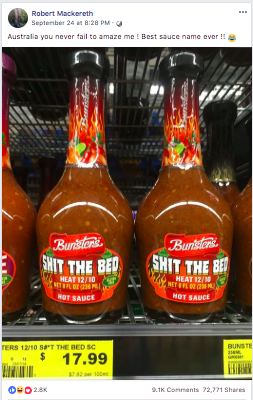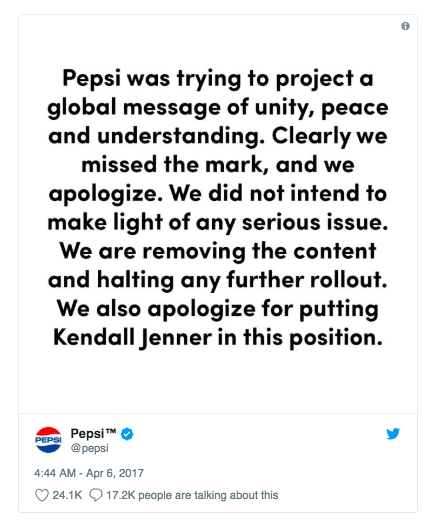“Viral marketing is any marketing technique that induces websites or users to pass on a marketing message to other sites or users, creating a potentially exponential growth in the message’s visibility and effect.” – Source
In today’s online world we often come across viral marketing campaigns that are either a hit or a miss for a company. This type of strategy can be effective as a stand-alone tool or can even be utilised as part of a larger marketing campaign for both large and small companies. Viral marketing can be especially attractive to smaller business, as it is more cost-effective than traditional marketing efforts.
 Source
Source
In an article posted today, a backpacker spotted a bottle of Bunster’s Hot Sauce so he snapped a photo and uploaded it to Facebook. A week later, the post blew up and today has now been shared more than 70,000 times and attracted nearly 9000 comments.
This particular social media viral marketing campaign was a “stroke of luck” as it was generated by a customer which led to other consumers sharing and tagging their friends in the comments. This is a great example of a positive viral campaign that has utilised a unique, shareable and simple campaign that has lead Bunster’s Hot Sauce on track to reach $1.5 million in sales by the end of the year.
 Bunsters Sh*t the Bed Hot Sauce – Source
Bunsters Sh*t the Bed Hot Sauce – Source
I do believe that there are many benefits to effective viral marketing that has an enticing as it can:
- Enhance a brands customer list
- Increase conversation about the brand
- Increase the credibility of a brand
- It is very cheap
However, if marketing is not planned out or initiated the right way it can lead to extremely negative outcomes for the business.
WHAT THE PEPSI?
Pepsi’s advertisement with high-profile member celebrity Kendall Jenner went viral alright but it did not bring any positivity to the brand. What Pepsi thought would be a viral video that addressed social justice caused backlash for the brand.
 Source
Source
I believe that brands MUST review a campaign before posting it online as it can either make or break the company.
Even though Pepsi is “still standing”, if smaller companies produce unsuccessful viral marketing campaigns they are just as well done for.
What do you think successful viral marketing campaigns should consist of?
Please comment below and share any examples!
I think it’s important for a successful viral marketing campaign to be able to convey the message of the brand, so consumers who have seen the ad will be able to connect with the brand and hence, an increase in brand recollection. Of course, a successful viral marketing campaign should also be novel, unique and engaging enough to grab the attention of a large audience base. Lastly, a bit of luck is needed to give the campaign to push
LikeLiked by 1 person
Great points Corlisse! All of those aspects should indeed be considered when creating a successful viral marketing campaign as the message should be understood by consumers in a creative way that grabs their attention and makes them want to share and spread the word around!
LikeLike
Just as you mentioned, if not executed correctly it can have a really detrimental affect on the brand. In some cases it’s out of marketers control as well, as the hot sauce as an example. It easily could’ve turned the opposite way for Bunsters, as if the consumer had a negative comment to spread like “shit the bed tastes like shit” then it could have a real awful outcome for the brand instead! So it’s tricky, it can only be controlled so much but I suppose as long as marketers monitor it and try to make it associates as positively as possible, the rest is unknown!
LikeLiked by 1 person
Interesting point Alex! Yes it is very hard to control a campaign as many people have different views on messages thus it should be monitored by marketers to ensure that campaign is received on more of the positive side!
LikeLike
Great blog! I personally feel like viral marketing could really go both ways! The sauce example is something that a consumer-created and the brand has nothing to do with it but simply benefitted from luck. However, the Pepsi example from what I think it puts too much effort into a marketing campaign hoping that it would go viral but it did not! I feel like it is very hard for any company to plan a viral campaign because what goes viral is in the hands of the public and you just never know! I feel like what brands should do is just try to come up with a unique and positive campaign and leave the “viral” to the public to judge!
LikeLiked by 1 person
Great point Tanisha! I think what Pepsi did was come up with a campaign that the thought was unique and positive and they did not expect to receive that judgement from the public! I believe they thought that by just putting a well know celebrity like Kendall Jenner into it people would love the campaign but that wasn’t the case as they offended many consumers!
LikeLike
Great post! I think viral marketing does require some luck, as with the busters example,and it being the right ad at the right time. I agree with the above comment that brands shouldn’t allow their message or brand to get lost in the advertisement. When something is going viral brands should be also be engaging with the audience and directing the conversation to keep it positive.
LikeLiked by 1 person
Yes agreed. Brands should engage with the audience and direct the conversation to keep it positive. I believe some brands try to do that but they end up hurting their brand… so they should really review their campaign and have many sources look at it before it is available to the public!
LikeLike
Great post Danielle! The Pepsi ad was definitely an ad that didn’t go well, however i do think they handled it correctly with the apology. I agree with all of your points, but its very hard to determine whether it is going to be successful marketing campaign or not
LikeLiked by 1 person
It is very hard to determine if a campaign will be successful but I do believe a campaign should be looked at my multiple sources before it is available to the public so that marketers can get multiple opinions! Just like with the Pepsi campaign I think that it did go very wrong because the message was not properly reviewed… they could have avoided this video if they had multiple people who reviewed the video being offended by it!
LikeLike